1970s
Psychomania
Full story here.
Posted By: Paul - Fri Feb 17, 2017 -
Comments (4)
Category: Horror, Ineptness, Crudity, Talentlessness, Kitsch, and Bad Art, Movies, 1970s, Motorcycles
Sneeze cured deafness
1973: Jean Haynes was almost deaf since birth, but then an allergic reaction triggered a bout of sneezing. Seems that she sneezed quite a bit. But finally, she gave one big sneeze, and suddenly she could hear again.This falls into the recurring weird news theme of accidental cures (such as people who get hit in the head and are cured of blindness).
But I'm also reminded of the cases of people who blew their nose and had an eye fell out.
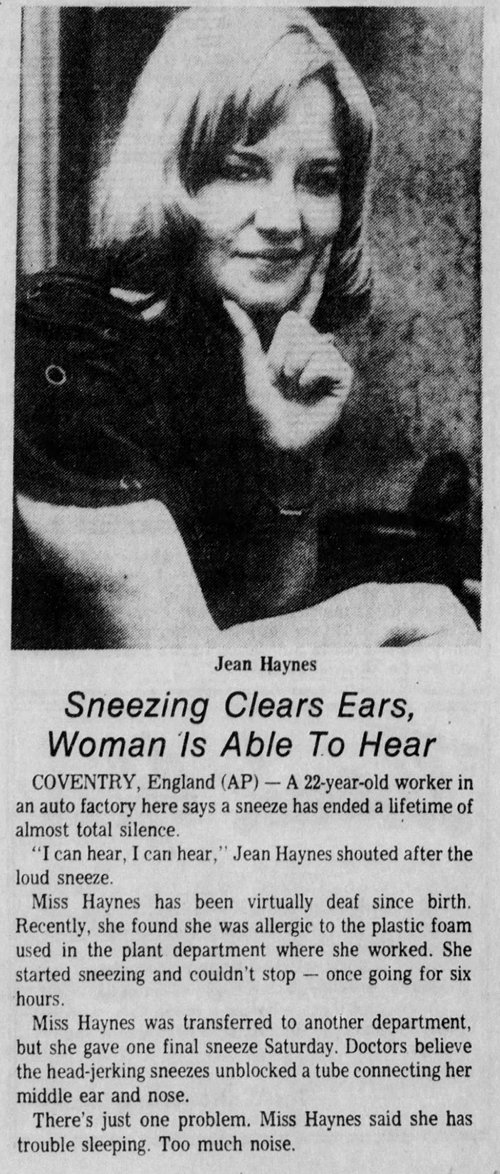
La Crosse Tribune - Jan 9, 1973
COVENTRY, England (AP) — A 22-year-old worker in an auto factory here says a sneeze has ended a lifetime of almost total silence.
"I can hear, I can hear," Jean Haynes shouted after the loud sneeze.
Miss Haynes has been virtually deaf since birth. Recently, she found she was allergic to the plastic foam used in the plant department where she worked. She started sneezing and couldn't stop — once going for six hours.
Miss Haynes was transferred to another department, but she gave one final sneeze Saturday. Doctors believe the head-jerking sneezes unblocked a tube connecting her middle ear and nose.
There's just one problem. Miss Haynes said she has trouble sleeping. Too much noise.
Posted By: Alex - Mon Feb 13, 2017 -
Comments (6)
Category: Health, 1970s
Chore your way to fitness
In 1972, Sears, Roebuck & Co. commissioned fitness expert Nicholas Kounovsky to devise exercises that could be done by housewives while vacuuming. He came up with the "Chore Your Way to Fitness" program. He wrote, "Your vacuum cleaner becomes a portable gym, and you can help tone up lazy muscles as you do your routine cleaning chores."It sounds like this program was outlined in a pamphlet of some kind. But unfortunately I haven't been able to find a copy of this pamphlet anywhere.
The general concept reminds me of an earlier post from way back in 2012 — Jayne Mansfield's tips on exercising with a broomstick.
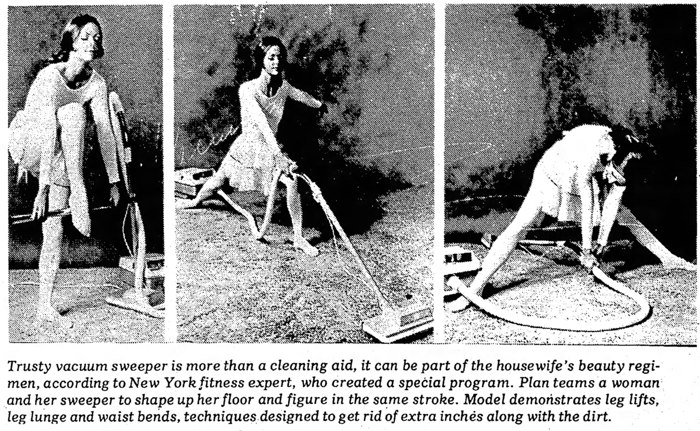
The Vidette Messenger - Dec 11, 1972
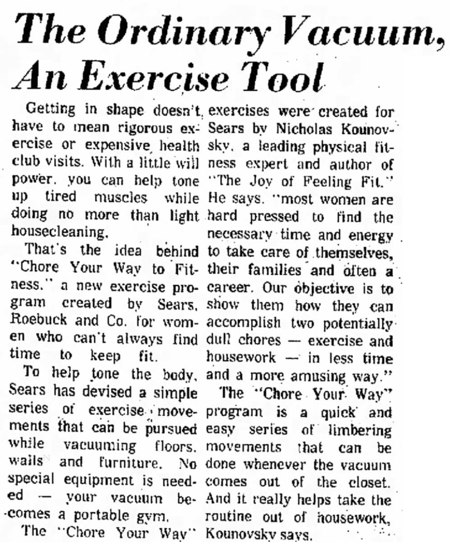
The San Mateo Times - Sep 27, 1972

The Joy of Feeling Fit, by Nicholas Kounovsky
Posted By: Alex - Fri Feb 10, 2017 -
Comments (3)
Category: Exercise and Fitness, 1970s
Liberace Does Aquarius
Posted By: Paul - Thu Feb 09, 2017 -
Comments (5)
Category: Eccentrics, Bohemians, Beatniks, Hippies and Slackers, Ineptness, Crudity, Talentlessness, Kitsch, and Bad Art, Music, Television, 1960s, 1970s
Have you installed a thermidor in your automobile?
In 1975, the Federal Energy Administration (FEA) conducted a telephone survey about energy conservation and included the question, "Have you installed a thermidor in your automobile?"Five percent of the people who took the survey stated that they had. Therefore, the FEA concluded that 5 percent of the survey takers were lying in their responses, because Thermidor is a month in the French revolutionary calendar.
Though, to be fair, Thermidor does sound like it could be some kind of heating device.
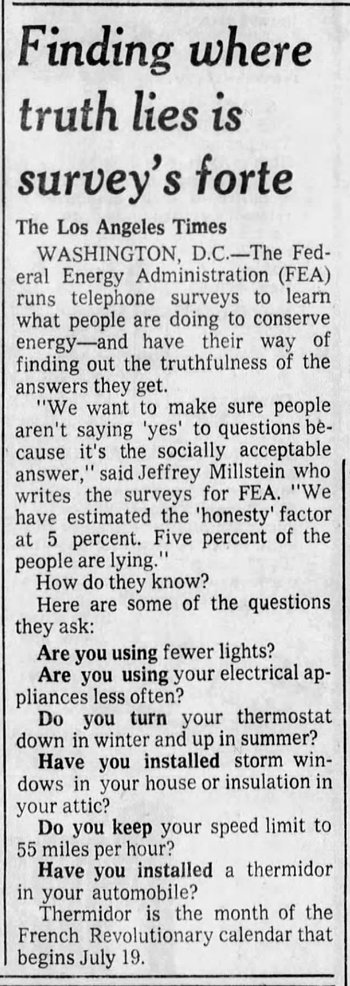
The Minneapolis Star - Sep 11, 1975
Posted By: Alex - Fri Feb 03, 2017 -
Comments (6)
Category: 1970s, Cars
The Ingredients of Chanel No. 5
February 1972: There was a popular outcry after Jacques Leal, London Chairman of Chanel Ltd., revealed during an interview that one of the ingredients of Chanel No. 5 perfume was the "sweat of the whipped Abyssinian civet cat."He explained, "We don't usually like to admit, but it's one of those ancient techniques the Chinese invented. They put the cat's head into a sort of torture chamber, whip it, the cat gets mad, and it gives off a glandular secretion."
However, Leal assured the interviewer that the Chanel company itself didn't whip the civet cats. "We just buy the stuff in bottles."
Other Chanel No. 5 ingredients included castoreum from the Canadian beaver, ambergris from the sperm whale of Chile, and musk from the Tibetan deer.
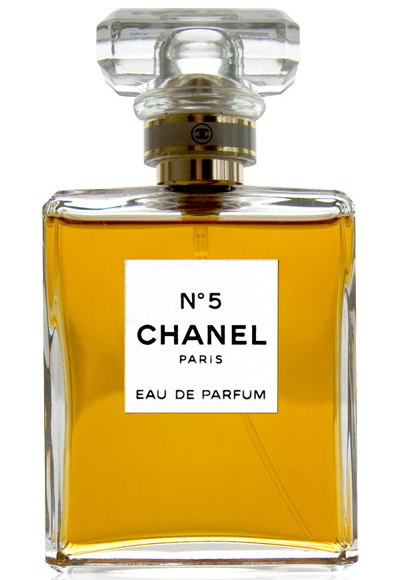

The Provo Daily Herald - July 16, 1972
Posted By: Alex - Sat Jan 28, 2017 -
Comments (2)
Category: 1970s, Perfume and Cologne and Other Scents
Butterflies in my stomach
Ronald Taylor, a professor of pathology at the University of Southern California School of Medicine, was an early promoter of an insect-based diet. In the 1970s, he published two books on the topic: Butterflies in My Stomach: Insects in Human Nutrition (1975) and Entertaining With Insects, Or: The Original Guide to Insect Cookery (1976). Some of the recipes in the books included:- Boiled cod with snail sauce
- Wasp grubs fried in the comb
- Moths sauteed in butter
- Braised beef with caterpillars
- New carrots with wireworm sauce
- Gooseberry cream with sawflies
- Devilled chafer grubs
- Stag beetle larvae on toast
The full recipe for Peanut Butter Worm Cookies is below.
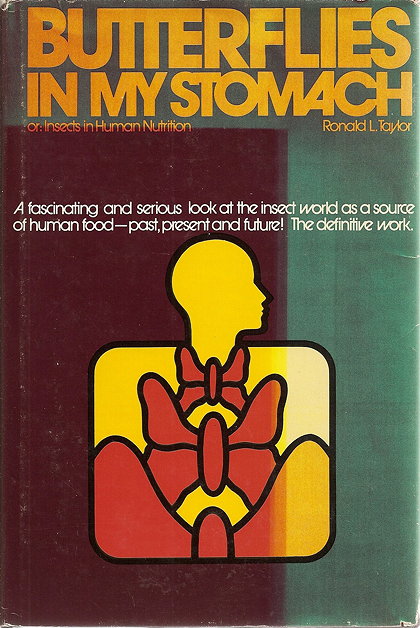


Posted By: Alex - Sun Jan 22, 2017 -
Comments (2)
Category: Food, Cookbooks, Insects and Spiders, 1970s
The Ballad of Evel Knieval
Posted By: Paul - Tue Jan 17, 2017 -
Comments (1)
Category: Daredevils, Stuntpeople and Thrillseekers, Eccentrics, Music, 1970s, Motorcycles
Yogi’s Space Race
Here in the fortieth anniversary year of Star Wars, let us pause to consider all the ways in which it elevated the genre of science fiction, inspiring such followers as Yogi's Space Race.
Wikipedia page here.
Posted By: Paul - Thu Jan 05, 2017 -
Comments (2)
Category: Aliens, Anthropomorphism, Ineptness, Crudity, Talentlessness, Kitsch, and Bad Art, Homages, Pastiches, Tributes and Borrowings, Cartoons, 1970s
The Egg
Posted By: Paul - Fri Dec 30, 2016 -
Comments (4)
Category: Fantasy, Eggs, Stop-motion Animation, 1970s, North America

| Who We Are |
|---|
| Alex Boese Alex is the creator and curator of the Museum of Hoaxes. He's also the author of various weird, non-fiction, science-themed books such as Elephants on Acid and Psychedelic Apes. Paul Di Filippo Paul has been paid to put weird ideas into fictional form for over thirty years, in his career as a noted science fiction writer. He has recently begun blogging on many curious topics with three fellow writers at The Inferior 4+1. Contact Us |




